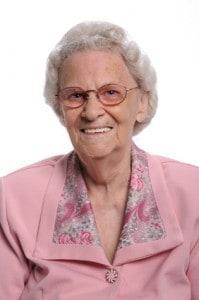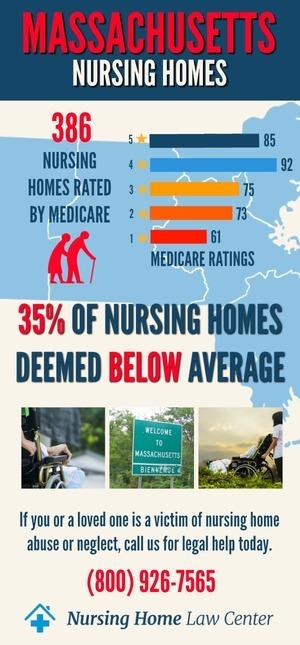The Nursing Home Law Center is committed to providing the legal resources necessary to hold negligent facilities accountable.
Massachusetts Nursing Home Abuse Attorney
Elder abuse and nursing home negligence are growing concerns in Massachusetts, where many assisted living facilities fail to meet the standard of care that senior citizens deserve.
Seeking legal help from a Massachusetts nursing home neglect lawyer is essential to holding negligent facilities accountable. An experienced attorney can guide you through the legal process, ensuring your loved one receives fair compensation for their nursing home injuries and that those responsible for the abuse are brought to justice.
Why Hire Nursing Home Law Center
At Nursing Home Law Center, we are dedicated to obtaining just compensation for victims of nursing home abuse. Our skilled legal team has a strong history of successfully handling nursing home neglect claims, addressing these sensitive cases with care, and securing significant settlements and verdicts.
Our nursing home negligence lawyers leave no stone unturned in our investigations, making sure every element of the abuse, including medical costs, emotional distress, and other damages, is fully covered. With our extensive knowledge of nursing home neglect cases, we skillfully manage the legal process and fight relentlessly to protect your rights.
Types of Cases Handled by Our Massachusetts Nursing Home Abuse Lawyers
Nursing home abuse refers to the mistreatment or neglect of nursing home patients, often resulting in physical, emotional, or financial harm. Abuse can occur in many forms, each having devastating effects on the well-being of elderly patients. Our nursing home lawyers handle a wide range of cases to ensure that victims receive the justice they deserve.
Physical Abuse
Physical abuse includes the intentional infliction of harm, such as hitting, slapping, or pushing nursing home residents. It can also involve improper use of physical or chemical restraints.
Mental and Emotional Abuse
Mental and emotional abuse involves actions that cause psychological harm to elderly residents, such as verbal threats, intimidation, or isolation.
Sexual Abuse
Sexual assault is a particularly heinous form of mistreatment involving any non-consensual sexual contact with a resident.
Medical Malpractice
Medical malpractice in nursing homes includes failures such as improper treatment, misdiagnoses, or neglect of medical care. This neglect can result in bed sores, medication errors, or infections that could have been prevented with proper medical attention.
Negligence
Negligence occurs when a nursing home fails to meet the basic standards of care, leading to serious harm. This negligence can include poor hygiene, malnutrition, dehydration, or even incidents where residents wander away from the facility (known as elopement).
Financial Abuse
Financial abuse involves the exploitation of elderly residents for financial gain. This abuse may include unauthorized withdrawals from their accounts, changes to their wills, or theft of personal property.
Wrongful Death
When elder abuse and nursing home negligence lead to the death of a resident, it constitutes wrongful death. Whether caused by physical abuse, medical negligence, or unsafe conditions, the loss of a loved one is devastating. Our legal team works tirelessly to hold nursing facilities accountable and ensure families receive justice for their loved one’s untimely passing.
Understanding Your Legal Rights

Nursing home residents are entitled to certain protections under federal and state laws to ensure their safety, dignity, and well-being. These legal rights are critical in preventing abuse, neglect, and exploitation in nursing homes and assisted living facilities.
One of the most important federal laws safeguarding nursing home patients is the Nursing Home Reform Act of 1987. This law mandates that residents have the right to receive proper medical care, maintain their privacy, live free from abuse and neglect, and be treated with respect and dignity.
It also requires nursing homes to ensure that residents receive adequate care and services to maintain their physical and mental well-being. Under this act, nursing home facilities must adhere to specific standards to ensure that their care meets necessary legal requirements.
In addition to federal protections, Massachusetts state laws provide residents with further safeguards. The state regulates nursing homes to ensure they meet specific standards of care and requires facilities to report incidents of abuse and neglect to the proper authorities.
These laws allow residents and their families to take legal action if a nursing home fails to meet its obligations due to inadequate staffing, poor training, or other forms of negligence.
Eligibility to File a Claim
When nursing home abuse and neglect occurs, several parties can take action to protect the victim’s rights. Those who can file a lawsuit include:
- The residents themselves: If the nursing home residents are mentally and physically capable of doing so, they can file a nursing home abuse lawsuit.
- A legal guardian or representative: If the resident is incapacitated or unable to pursue legal recourse due to their health condition, a court-appointed guardian or legal representative can file the lawsuit.
- Families: In many cases, immediate family members—such as a spouse, child, or other close relatives—may file a claim if they suspect their loved one is being abused or neglected in a nursing home.
- Estate representatives: If nursing home abuse and neglect lead to a wrongful death, the personal representative of the deceased resident’s estate (often a family member or executor) can file a wrongful death claim.
How Our Massachusetts Nursing Home Abuse Attorneys Can Help

At Nursing Home Law Center, our Massachusetts personal injury attorneys have extensive experience in representing victims of nursing home abuse and neglect.
Our law firm is skilled in handling complex personal injury cases, from investigating claims to securing significant settlements and verdicts. We are here to guide you through every step of the legal process, ensuring your loved one’s rights are fully protected.
Free Case Evaluation
We offer a free consultation to review your case and assess whether there are grounds for a personal injury claim. During this evaluation, our attorneys will listen to your concerns, review the details of the abuse or neglect, and explain your legal options.
Case Investigation
Our legal team conducts a thorough investigation of the nursing home abuse claim to gather evidence and build a strong case. This investigation involves examining medical records, interviewing witnesses, and identifying signs of abuse or neglect, such as bed sores, restraint marks, or poor hygiene.
Filing the Claim
Once the investigation is complete, we handle all aspects of filing the claim. This process includes preparing the necessary legal documents, adhering to deadlines, and ensuring the claim is filed in the correct jurisdiction.
Settlement Negotiation
Many nursing home neglect cases are resolved through settlement negotiations, where both parties agree to a fair settlement amount without going to trial. Our personal injury attorneys have significant experience negotiating compensatory damages, such as medical expenses, emotional trauma, and any other damages caused by the abuse.
Trial Representation
We are fully prepared to take your case to court if we cannot agree on a fair settlement. Our attorneys have extensive experience in trial representation and will advocate fiercely for you before a judge and jury.
Common Signs of Elder Abuse Among Nursing Home Residents
Elder abuse in nursing homes can often go unnoticed, especially when residents are unable to communicate the mistreatment they are experiencing. However, there are several warning signs that family members and loved ones should be aware of to help detect abuse early.
- Bruises, cuts, broken bones, or head injuries
- Frequent hospital visits
- Sudden changes in behavior
- Flinching when touched or showing reluctance to speak in front of caregivers
- Bruising in sensitive areas
- Bed sores (also known as pressure ulcers)
- Poor personal hygiene
- Malnutrition or dehydration
- Unexplained financial transactions
- Missing personal belongings
The worst-rated nursing homes in Massachusetts [1] include:
| Adviniacare Newburyport | Adviniacare Newton Wellesley |
| Advocate Healthcare of East Boston, LLC | Affinity Healthcare |
| Andover Forest Post Acute Care Center | Andover Manor Rehab and Nursing |
| Ayer Valley Rehab and Nursing | Bear Mountain at West Springfield |
| Bear Mountain at Worcester | Belvidere Healthcare Center |
| Blaire House of Milford | Bourne Manor Extended Care Facility |
| Brandon Woods of New Bedford | Brush Hill Care Center |
| Cape Heritage Rehabilitation & Health Care Center | Cape Regency Rehabilitation & Health Care Center |
| Care One at Redstone | Charlwell House Health and Rehabilitation |
| Colony Center for Health and Rehabilitation | Eastpointe Rehab Center |
| Fall River Healthcare | Fall River Jewish Home |
| Garden Place Healthcare | Hathaway Manor Extended Care |
| Hathorne Hill Rehabilitation and Healthcare Center | Hellenic Nursing & Rehabilitation Center |
| Highview of Northampton | Keystone Center |
| Lanessa Extended Care | Lighthouse Nursing Care Center |
| Maplewood Center | Mattapan Health & Rehabilitation Center |
| Meadows of Central Massachusetts (The) | Medford Rehabilitation and Nursing Center |
| Medway Country Manor Skilled Nursing & Rehabilitation | Melrose Healthcare |
| Mill Town Health and Rehabilitation | Northwood Rehabilitation & Healthcare Center |
| Norwood Healthcare | Oxford Rehabilitation & Health Care Center, The |
| Park Avenue Health Center | Parkway Health and Rehabilitation Center |
| Pine Knoll Nursing Center | Pioneer Valley Health & Rehabilitation |
| Pleasant Bay of Brewster Rehab Center | Plymouth Harborside Healthcare |
| Plymouth Rehabilitation & Health Care Center | Poet’s Seat Healthcare Center |
| Presentation Rehab and Skilled Care Center | Quabbin Valley Healthcare |
| Regalcare at Courtyard-Medford | Regalcare at Glen Ridge |
| Regalcare at Holyoke | Regalcare at Lowell |
| Royal Norwell Nursing & Rehabilitation Center LLC | Sachem Center for Health and Rehabilitation |
| Salem Rehab Center | Sarah S Brayton Center |
| Saugus Center | Serenity Hill Nursing Center |
| Sixteen Acres Healthcare Center | Southeast Health Care Center |
| Southpointe Rehab Center | St Joseph Rehab & Nursing Care Center |
| The Guardian Center | Twin Oaks Center |
| Vantage at Wilbraham LLC | Wachusett Manor |
| Watertown Rehabilitation and Nursing Center | Wedgemere Healthcare |
| Westborough Healthcare | Westfield Gardens Nursing and Rehab |
| Westford Nursing and Rehabilitation Center | West Newton Healthcare |
| Wilmington Rehab Center | Windsor Nursing & Retirement Home |
| Worcester Rehabilitation & Health Care Center |
The Cost of Hiring a Massachusetts Nursing Home Abuse Lawyer
At Nursing Home Law Center, we understand that the financial burden of pursuing a legal case can be overwhelming, especially when dealing with the trauma of nursing home abuse. To ensure that every family has access to justice, we operate on a contingency fee basis.
This arrangement means there are no upfront costs or fees for hiring our legal team. You only pay if we successfully secure a settlement or verdict in your favor.
You Have Limited Time to Take Legal Action in Massachusetts
Massachusetts has a limited time frame in which you can file a nursing home abuse lawsuit, known as the statute of limitations. Generally, victims and their families have three years from the date the abuse occurred or was discovered to file a lawsuit. Failing to take legal action within this period can result in losing the right to seek compensation for the abuse or neglect suffered.
Contact a Massachusetts Nursing Home Attorney Today!
At Nursing Home Law Center, we have extensive experience advocating for victims of nursing home abuse across Massachusetts. Our skilled personal injury attorneys are committed to holding negligent nursing homes accountable and securing the justice and compensation your loved one deserves.
Contact us now to schedule your free consultation and take the first step toward justice!
Call us at (800) 926-7565 or fill out our contact form.
References: [1] Medicare


